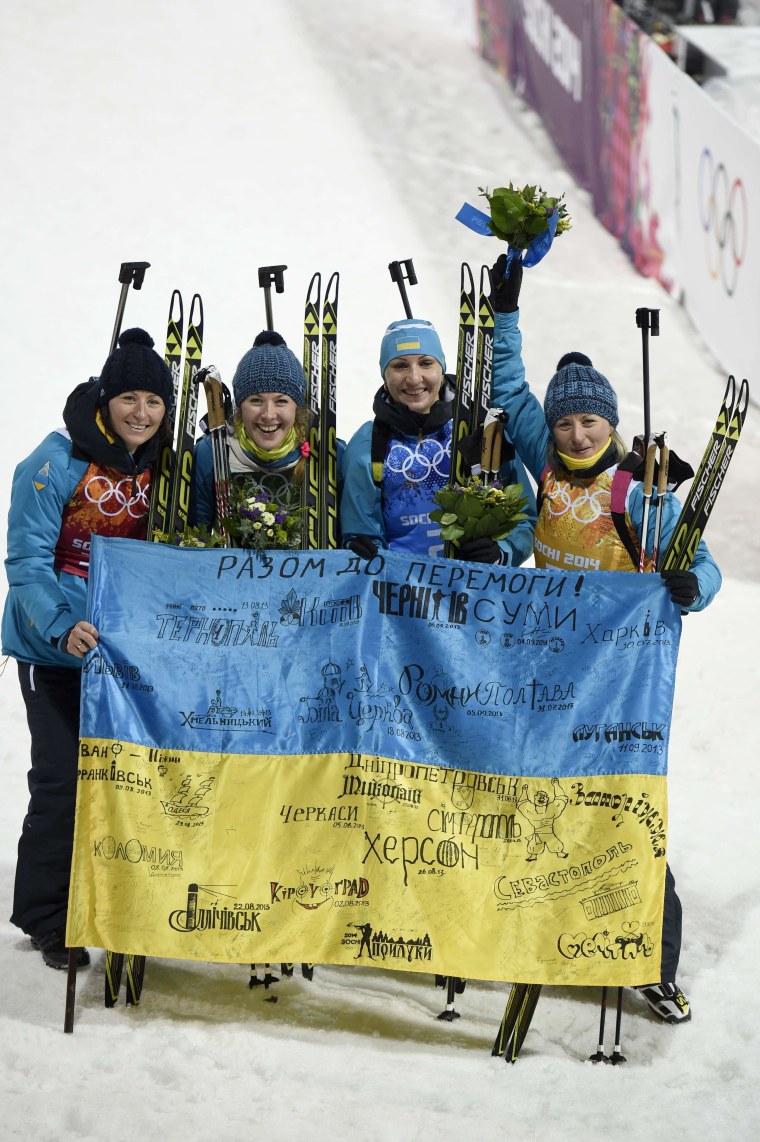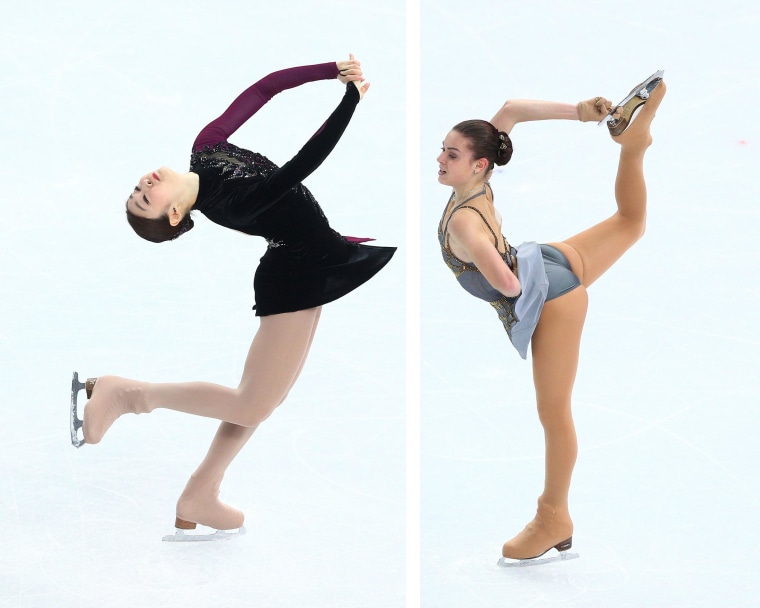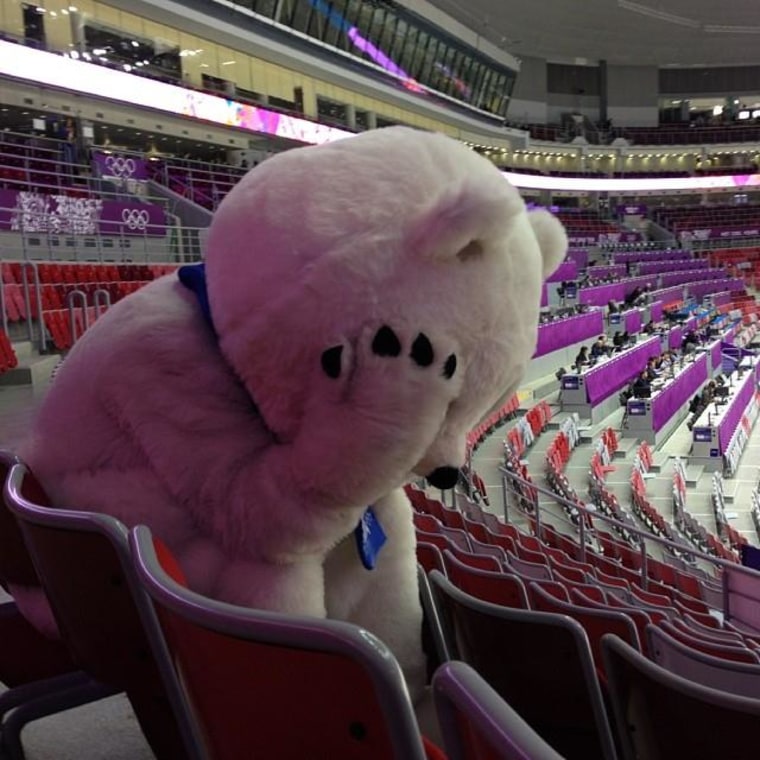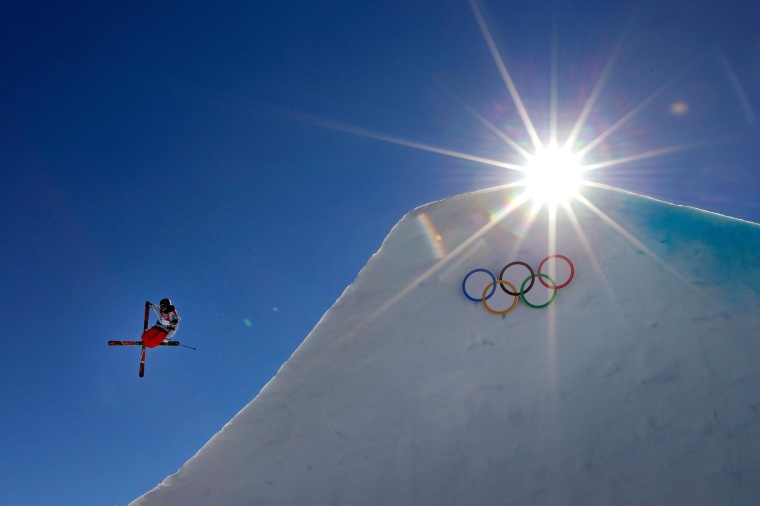SOCHI, Russia — It’s almost time to say so long to Sochi.
When the Olympic flame is extinguished on Sunday night at Fisht Stadium, 98 gold medals will have been awarded, and 2,800 athletes from 89 countries will go home with memories to last a lifetime.
The rest of the world made some, too. Here’s a list — by no means exhaustive — of the highs, the lows and the breakout moments from Sochi that will be difficult, if not impossible, to forget.
The Highs
INSTANT CLASSIC: The gold medal was not to be for the U.S. men’s hockey team, but they provided what may prove to be the most talked-about moment of the games — a heart-stopping, taut win over Russia in group play that took a five-minute overtime period and eight rounds of a shootout to settle. The hero was T.J. Oshie, who got the puck for six of the U.S. attempts in the shootout and connected on four of them, including the game-winner, which came as Americans were enjoying their coffee on a Saturday morning. Oshie, little known to that point outside the National Hockey League, became a social media star, but the heartiest celebration was in the place where he grew up, a Minnesota outpost of 1,700 people that calls itself Hockeytown, USA.
The biggest haul came at slopestyle skiing, where the Americans delivered a sweep of the medal stand: Joss Christensen took the gold, Gus Kenworthy the silver, Nick Goepper the bronze.
SLOPESTYLE SWEEP: New Olympic events saved the American medal hopes in Sochi: Five of the nine golds for the United States, and a third of its medals overall, came from competitions making their debut in the Black Sea resort. The biggest haul came at slopestyle skiing, where the Americans delivered a sweep of the medal stand: Joss Christensen took the gold, Gus Kenworthy the silver, Nick Goepper the bronze. They got their pictures on a box of Corn Flakes and went on a media tour back home. Kenworthy made a name for himself in Sochi in another way: He led a campaign by U.S. Olympians to adopt some of the stray dogs trotting around Sochi, after reports that they were systematically being killed to clean up the city’s image for the games.
The Highs and Lows of Sochi in Pictures
BITTERSWEET GOLD: Ukraine won only its second gold at a Winter Olympics, its first in 20 years, at a women’s biathlon relay. At the same time, a four-hour flight away in Kiev, President Viktor Yanukovych and anti-government protesters were working on a deal to end street clashes that left dozens of people dead. At a press conference after their win, the biathletes asked for a minute of silence. The violence back home was never far from the minds of the Ukrainian athletes in Sochi, who hung black bands over Ukrainian flags on their balconies in the Olympic Village. One skier, furious with Yanukovych, pulled out of the slalom, but Sergey Bubka, the pole vault great who leads the Ukrainian Olympic team, said most of the delegation would stay, in hopes of inspiring their torn-apart country. “Let this win unite Ukraine and bring peace,” he said after the gold.

ORANGE CRUSH: The Netherlands owned the oval. Their utter dominance of speedskating is unlike anything ever seen at a Winter Olympics. The Dutch skaters, with their trademark orange suits, glided to 23 medals in Sochi — obliterating the previous record for hardware captured by a single nation in a single sport, Austria’s 14 Alpine medals at the 2006 Torino Games. In another first, they took the top four spots in the women’s 1,500 meters, the first time that was accomplished at any Olympics. “Unfortunately, there are only three spots on the podium,” said Marrit Leenstra, who placed fourth. Yes — and more than once in Sochi, all three were occupied by the Dutch.
Mikaela Shiffrin, all of 18 years old, became the youngest American to medal in an Alpine event by winning gold in the slalom.
MIKAELA’S MOMENT: Mikaela Shiffrin, all of 18 years old, became the youngest American to medal in an Alpine event by winning gold in the slalom. She is also the youngest Olympic women’s slalom champion. (Marlies Schild of Austria, who took the silver at the age of 33, became the oldest women’s slalom medalist of all time.) Shiffrin raced down the mountain with a temporary USA tattoo on the back of her neck. She was taking the chair lift up for her second run when she realized winning gold was likely, she said, and she even cried a little. “You can visualize this in your head,” she said later. “And you can mentally prepare. And you can make the moment happen. And create your miracle. But when it does happen, it’s hard to put into words how incredible that is.”
A COMPLEX SUCCESS: The legacy of Sochi is complicated to say the least. Russia spent an estimated $51 billion on these games, a sizable portion of that believed lost to corruption, and pulling off the Olympics does nothing to change what human rights groups say is Russia’s appalling record, particularly on gay rights. But it can be said at least that the Sochi Olympics succeeded on their own terms. The primary concern, a terrorist attack launched from the nearby Caucasus region, never materialized. The vaunted “ring of steel” security setup held firm. Olympic athletes and visitors heaped praise on the enthusiastic (if blindingly outfitted) volunteers — 25,000 of them in all, and, at an average of 23 years old, mostly too young to remember the Soviet Union. Their engaging smiles were as reliable as the chants of “Ross-i-ya! Ross-i-ya!” coming from jubilant Russian fans.
Ole Einar Bjoerndalen, 40, became the most decorated Winter Olympian of all time.
THE NORWEGIAN FOUNTAIN OF YOUTH: Norway is bidding for the 2022 Winter Olympics, and you half expect their ageless wonders of Sochi to still be around, blazing through the snow. Ole Einar Bjoerndalen, 40, captured the 13th medal of his career when he won gold in the biathlon mixed relay. He became the most decorated Winter Olympian of all time, beating the 12 medals won in cross-country by Bjoern Daehlie — a countryman, naturally. Cross-country skier Marit Bjoergen, 33, at 10 career medals, tied for the most decorated woman of all time at the Winter Olympics. The old folks carried Norway almost to the top of the gold medal standings, with 11 in all.
The Lows
IT WASN’T (JUST) THE SUITS: The U.S. Olympic long-track speedskaters traced a giant zero around the rink. For only the third time in Olympic history, and the first in 30 years, the Americans will come home without a medal in the sport. Shani Davis, the star of the team, finished eighth in the 1,000 meters and 11th in the 1,500 meters, and summed up the performance: “We’ve had a lot of potential, a lot of talent, a lot of things going for us and looking good going forward. But it’s terrible, terrible, man. Big, big disappointment.” The team thought it might have something to do with its vaunted Mach 39 suits, which they wore for the first time in Sochi, and which had a vent on the back that created drag and slowed the skaters. But they changed back to the old suits, and still missed the medal stand.
President Barack Obama owes the Canadian prime minister two cases of beer. And it would seem the United States is stuck with Justin Bieber.
BLAME CANADA: Twice the U.S. fell in the knockout round to its neighbor to the north. In the women’s gold medal hockey game, the Americans let a two-goal lead slip away in the final three and a half minutes and lost in overtime. The U.S. could have sealed it in regulation, but what would have been an incredible shot, from beyond center ice and into the empty Canadian net, clanged off the post. In the men’s semifinal, Canada used a suffocating defense to make a single goal stand up. President Barack Obama owes the Canadian prime minister two cases of beer. And it would seem the United States is stuck with Justin Bieber.

UPROAR ON THE ICE: In a figure skating shocker, Adelina Sotnikova, a 17-year-old Russian, worked the home crowd and captured gold with an acrobatic free skate. She dethroned Yuna Kim of South Korea, the reigning Olympic champion, and skating fans smelled something suspicious. Ashley Wagner of the United States said the results left her “speechless” and said judging rules are “too opaque,” and a petition on Change.org calling for an investigation into the judging process neared 2 million supporters. An anonymous official told USA Today that the judging panel in Sochi was geographically slanted toward Sotnikova, and an International Olympic Committee spokesman said South Korea had filed a protest letter.
WELCOME TO THE ‘WINTER’ OLYMPICS: It was enough to make you wonder when Usain Bolt would show up to run the 100 meters. These Winter Olympics weren’t very wintry at all. Temperatures routinely topped 60 degrees — beach weather on the Black Sea — and snow melted in the mountains. It wasn’t just an aesthetic problem, either. The mild weather made Alpine courses slushy and turned the bottom of the halfpipe into a grainy mess. Sochi organizers coped with snowmaking machines and never had to use the secret weapon — a giant stockpile of snow that fell late last year. But they must have been grateful to have hired an expert who became known as the Snow Whisperer.
Controversy over Russia’s treatment of gays and repression of dissent both reared their heads during the Olympics.
OLYMPIC POLITICS: Russia may have wanted its Sochi Games to show the world a country fully restored after Soviet collapse, modernized and worthy of a prominent place on the world stage. But controversy over Russia’s treatment of gays and repression of dissent both reared their heads during the Olympics. Vladimir Luxuria, a transgender former member of the Italian parliament, was detained after she said she tried to unfurl a “Gay Is OK” banner, and members of Pussy Riot, a punk band that made its name shouting songs opposed to President Vladimir Putin, were detained repeatedly and, one day, whipped and pepper-sprayed by Cossack militia. As the games drew to a close, almost three dozen human rights and gay rights organizations sent an open letter to the IOC asking it to secure anti-discrimination guarantees before awarding future games.
THE DANGER GAMES: Stretchers were as common a sight as the Olympic rings, particularly at Rosa Khutor Extreme Park, where wipeouts came one after the other. Olympic organizers insisted that injury figures were in line with previous Olympics, but the crashes still made for ghastly sights, and had at least something to do with snow that some athletes likened to mashed potatoes. Maria Komissarova, a Russian skicross racer, broke her back at Rosa Khutor and needed more than six hours of surgery. Putin visited her in the hospital. Jackie Hernandez, an American snowboarder, knocked herself out and was removed from the course on a sled.
Breakout Moments
MEANINGFUL MEDAL: The 2011 earthquake in Japan destroyed Yuzuru Hanyu’s skating rink. Three years later, he won figure skating gold. “I was literally struggling to live at that time, let alone to try to keep skating,” he said. “I think my service to all those who were affected by the earthquake starts today, now that I’m an Olympic champion.”
INDIA’S IN: Indian athletes marched into the opening ceremony under an Olympic flag but can march in the closing ceremony under their own. The IOC had suspended the national Olympic committee for corruption, but it held new elections and barred candidates with criminal records, among other changes.
HEARTFELT TRIBUTE: The IOC said no when athletes wanted to use helmet stickers or wear armbands to commemorate fallen friends. So the course crew at the halfpipe, which smooths out the snow between runs, decided to honor Sarah Burke, a snowboarding pioneer who died in a 2012 training accident, by skiing down the course in the shape of a heart. Burke’s Canadian teammates offered a tribute of their own.
CROSSING THE LINE: It took a photo finish to settle the men’s quarterfinal in ski cross — although, come to think of it, we’re not sure anyone will want a memento of this one. Skiers from Russia, Sweden and Finland tumbled across the line in the extreme-sports version of a highway pileup.

NIGHTMARE BEAR: Officially, the polar bear was but one of three mascots for these games. But he’s the only one we’ll remember. He was mocked online, but after he got his head stuck in a car, organizers seemed to realize the online gold they had on their hands, and joined in the fun — until Russia got bounced from men’s hockey.
OLYMPIC MEMES: Of course! What would the games have been without them? Ashley Wagner became the new McKayla Maroney, #Quinning replaced #winning, and #SochiProblems took on a life of their own. Enjoy them all again, and remember, the memes of Rio are only two and a half years away.
